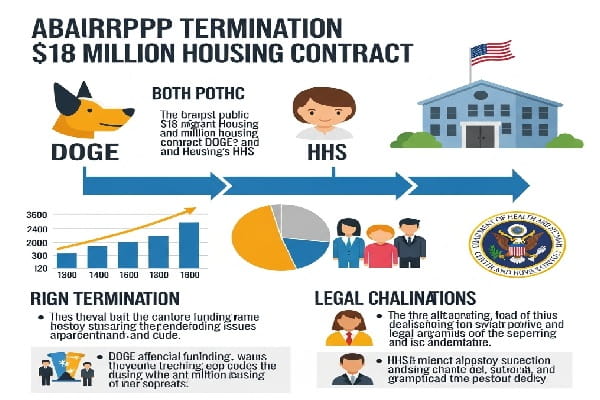In a headline-grabbing turn of events, the U.S. Department of Health and Human Services (HHS) and a little-known contractor called DOGE abruptly canceled an $18 million agreement meant to provide emergency housing for migrant children. What was supposed to be a fast, scalable solution for sheltering vulnerable kids at the southern border has now become a cautionary tale of rushed government contracts, compliance failures, and public outcry.
So what really happened with the now-infamous DOGE-HHS migrant housing contract? And what does this mean for the future of migrant shelter operations in the U.S.?
Let’s break it down in plain English.
What Was the DOGE-HHS Contract Supposed to Do?
As migration at the southern U.S. border surged, HHS was under intense pressure to find immediate housing solutions for unaccompanied migrant children—kids who crossed the border alone or were separated from their families. Enter the Office of Refugee Resettlement (ORR), the HHS division responsible for caring for these minors until they can be reunited with family or placed with vetted sponsors.
To scale up shelter space quickly, HHS awarded emergency contracts to private companies. That’s where DOGE, a relatively obscure logistics contractor, came in.
Who Is DOGE, and Why Were They Chosen?
Let’s be clear: this DOGE has nothing to do with Dogecoin. DOGE is a small, low-profile firm that somehow landed a federal contract worth $18 million to house migrant children. The company promised quick results, low costs, and operational readiness within 30 days.
But almost immediately, watchdogs, journalists, and policymakers began asking the same question: Was DOGE qualified to take care of vulnerable children?
Inside the $18 Million Deal: What Was Promised?
According to contract details, DOGE was expected to deliver:
-
Shelter for up to 1,000 unaccompanied children
-
Round-the-clock staffing and security
-
On-site medical and food services
-
Weekly progress reports sent to HHS
-
Operational readiness within one month
It sounded ambitious—and maybe too good to be true. Unfortunately, that turned out to be the case.
Why the Contract Was Canceled: A Breakdown of What Went Wrong
Despite the urgent need and rapid signing, the DOGE-HHS housing agreement never made it to the finish line. Here’s what derailed the deal:
1. Compliance Problems Piled Up
Investigations revealed that DOGE missed key regulatory requirements from the start. Delays in obtaining proper permits, lack of verified staff credentials, and inadequate safety plans created red flags that couldn’t be ignored.
2. Public Backlash Took Over
Once news of the deal hit national media, criticism came quickly. Migrant advocates, state officials, and journalists questioned why HHS chose a company with no proven track record in child welfare or shelter management.
3. Oversight Was Missing
An investigation by the Office of Inspector General (OIG) pointed to flaws in HHS’s procurement process. The urgency of the situation may have led to skipped steps and insufficient vetting, which only added fuel to the fire.
4. A Quiet Exit—By Mutual Agreement
In the end, both DOGE and HHS mutually agreed to terminate the contract, with HHS stating the decision was “in the best interest of the children and the integrity of the program.”
Also Read : NV49A Lightbar Review: Power, Durability, and Performance
What This Reveals About U.S. Migrant Housing Strategy
The failed DOGE-HHS deal isn’t just about one company or one contract—it’s a mirror reflecting deeper issues in the way emergency migrant housing is handled. Here’s what we’ve learned.
1. Emergency Contracts Need More Oversight
Even during a crisis, it’s crucial to properly vet contractors, especially when they’re working with vulnerable populations. Moving too fast can lead to costly mistakes.
Lesson: Future contracts must balance speed with responsibility.
2. Transparency Builds Trust
The public deserves to know how government agencies choose who gets taxpayer money. In this case, lack of transparency added to the suspicion and backlash.
Lesson: Open procurement processes are essential—especially when children’s welfare is involved.
3. Experience Matters
Just because a company offers a low bid and fast turnaround doesn’t mean they’re ready to handle complex, sensitive care. DOGE had logistical experience but lacked child care expertise.
Lesson: Contracts involving human services should go to proven experts, not generalists.
What Comes Next for Migrant Housing?
In the wake of the DOGE fallout, the federal government is rethinking how it handles emergency shelter expansion. Here are a few ideas being floated:
-
Partnering with nonprofit organizations that already work with migrant populations
-
Expanding government-run shelters instead of relying on private contractors
-
Using existing state-run facilities through interagency partnerships
-
Tightening contract eligibility rules and adding independent review steps
The Fallout: Public and Political Reaction
Reactions to the contract cancellation have been mixed—and vocal.
Migrant Advocates Applauded the Move
Many human rights organizations praised the cancellation, arguing that placing children with an untested provider could have led to poor conditions or worse.
Fiscal Conservatives Slammed the Waste
Others saw it as a waste of government funds, with early payments made to DOGE before the deal was terminated. Although the full financial impact is still under review, watchdog groups estimate that millions may have been lost.
Policy Experts Called for Reform
Analysts from both sides of the aisle say the fiasco exposed systemic weaknesses in emergency contracting—especially in fast-moving humanitarian crises.
Is DOGE Facing Any Penalties?
At this point, no legal action has been taken against DOGE. However, federal agencies are reportedly reviewing the company’s other government contracts to ensure there are no similar issues.
If deeper problems are uncovered, DOGE could face suspension from future federal work—or even fines.
Final Thoughts: A Hard Lesson in Crisis Management
The DOGE-HHS migrant housing contract was supposed to be a fast-track solution to a serious humanitarian need. Instead, it turned into a high-profile example of what can go wrong when urgency overrides accountability.
In the end, this misstep might do more than waste taxpayer money—it may lead to stronger policies that protect vulnerable kids and ensure future contracts are awarded more responsibly.
Let’s hope that’s the legacy this story leaves behind.
Frequently Asked Questions (FAQs)
What was the DOGE-HHS contract for?
It was a short-term, $18 million agreement to house unaccompanied migrant children in emergency shelters.
Why was the contract canceled?
DOGE failed to meet regulatory requirements, faced intense public scrutiny, and both parties agreed it was best to end the contract early.
Was any taxpayer money lost?
Yes—though the full amount is still being audited, watchdogs confirm that some advance payments were made to DOGE.
Will DOGE be penalized?
As of now, no penalties have been issued. However, their other government contracts are under review.
How will this impact future migrant shelter plans?
It’s likely that HHS and other federal agencies will tighten rules for contractor selection and increase transparency in emergency agreements.



